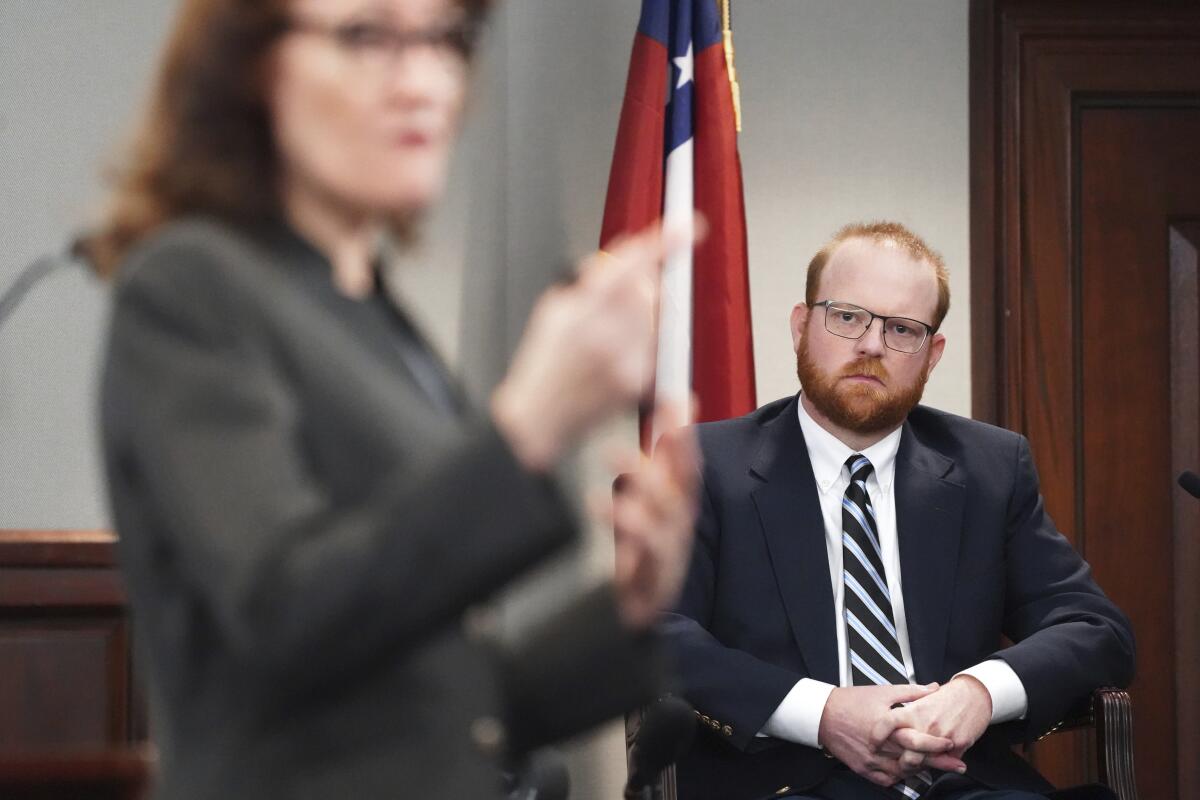Defense attorneys rest their case in trial involving death of Ahmaud Arbery

- Share via
BRUNSWICK, Ga. — Defense attorneys rested their case in the Ahmaud Arbery trial Thursday after calling just seven witnesses, including the shooter, who testified that Arbery did not threaten him in any way before he pointed his shotgun at the 25-year-old Black man.
Superior Court Judge Timothy Walmsley scheduled closing arguments in the trial for Monday, setting up the possibility of verdicts before Thanksgiving for the three white men charged with murder in Arbery’s death.
Under cross-examination by the prosecution on his second day of testimony, Travis McMichael said that Arbery hadn’t shown a weapon or spoken to him at all before McMichael raised his shotgun. But, McMichael said, he was “under the impression” that Arbery could be a threat because he was running straight at him and he had seen Arbery trying to get into the truck of a neighbor who had joined in a pursuit of Arbery in their coastal Georgia neighborhood.
“All he’s done is run away from you,” prosecutor Linda Dunikoski said. “And you pulled out a shotgun and pointed it at him.”
Cellphone video from the Feb. 23, 2020, shooting — replayed in court Thursday — shows Arbery running around the back of McMichael’s pickup truck after McMichael first points the shotgun while standing next to the open driver’s side door. Arbery then runs around the passenger side as McMichael moves to the front and the two come face to face. After that, the truck blocks any view of them until the first gunshot sounds.
McMichael’s testimony Wednesday marked the first time any of the three defendants has spoken publicly about the killing. The other two defendants did not testify. McMichael said Arbery forced him to make a split-second “life-or-death” decision by attacking him and grabbing his shotgun.
Dunikoski noted Thursday that’s not what McMichael told police in an interview about two hours after the shooting occurred.
“So you didn’t shoot him because he grabbed the barrel of your shotgun,” Dunikoski said. “You shot him because he came around that corner and you were right there and you just pulled the trigger immediately.”
“No, I was struck,” McMichael replied. “We were face to face, I’m being struck and that’s when I shot.”
McMichael said he had approached Arbery because neighbors indicated something had happened down the road and he wanted to ask Arbery about it. Arbery was running in the Brunswick neighborhood at the time. He said Arbery stopped, then took off running when McMichael told him police were on the way.
Asked how many times he had previously pulled up behind strangers in the neighborhood to ask them what they were doing there, McMichael said never.
“You know that no one has to talk to anyone they don’t want to talk to, right?” Dunikoski said.
The prosecutor also pressed McMichael on why he didn’t include some details of his testimony Wednesday in his written statement to police, namely the part about his telling Arbery police were on the way.
McMichael said he was “under stress, nervous, scared” at the time of his police interview and “probably being choppy.”
“What were you nervous about?” Dunikoski asked.
“I just killed a man,” McMichael responded. “I had blood on myself. It was the most traumatic event of my life.”
“You were nervous because you thought you were going to jail, right?” Dunikoski asked.
“No. I gave them a statement,” McMichael said.
McMichael and his father, Greg McMichael, armed themselves and pursued Arbery in a pickup truck after he ran past their home from a house under construction. A neighbor, William “Roddie” Bryan, joined the chase in his own truck and recorded cellphone video. Arbery’s killing deepened a national outcry over racial injustice after the video leaked online.
Defense attorneys have argued that their clients were lawfully trying to stop burglaries in their neighborhood and that McMichael opened fire in self-defense. Prosecutors say there’s no justification for what the men did and no evidence that Arbery had committed any crimes.
Six neighbors testified Thursday about sharing reports of property crimes and suspicious people on their subdivision’s Facebook page. Brook Perez said one neighbor’s 2019 post about a car break-in prompted her to check her husband’s truck and discover some of his tools missing.
“I’m home by myself with the kids,” Perez said. “So it just felt like a violation.”
Outside the Glynn County courthouse, hundreds of pastors gathered while a defense lawyer renewed his bid to keep Black ministers out of the courtroom. The Rev. Jesse Jackson again joined Arbery’s family in the courtroom, as he had on some other days this week. Walmsley declined to take the issue up again, noting he’d already rejected the same motion from Bryan attorney Kevin Gough twice.
Gough first asked the judge last week to remove the Rev. Al Sharpton from the court, saying the civil rights activist was trying to influence the disproportionately white jury. He also has complained that activists outside the courthouse are trying to influence the jury with banners and signs, and likewise objected to the pastors’ rally.
“We had a huge protest at lunchtime that was so loud, with bullhorns literally 20 feet from the front door of this courthouse, that you could literally hear what was being said at the doors of this courtroom,” Gough told the judge.
More to Read
Sign up for Essential California
The most important California stories and recommendations in your inbox every morning.
You may occasionally receive promotional content from the Los Angeles Times.













